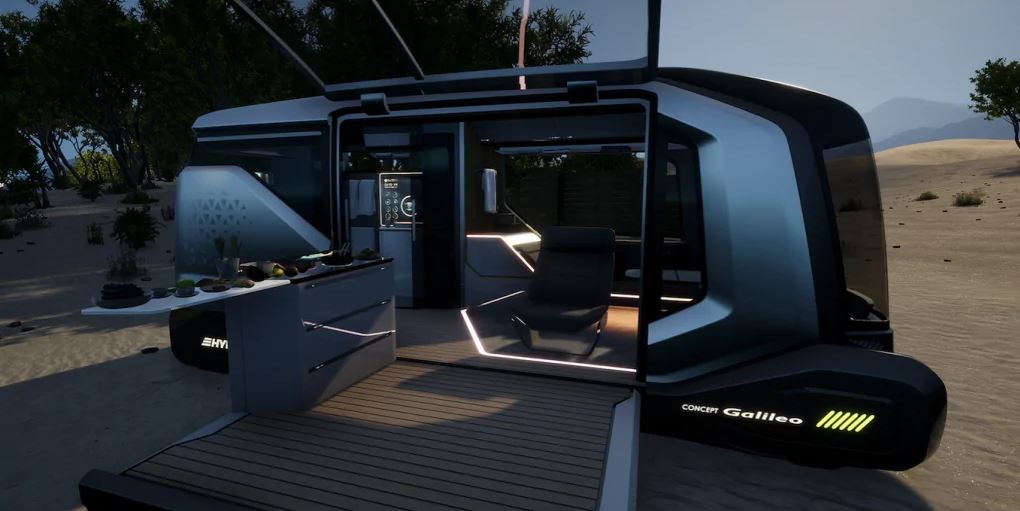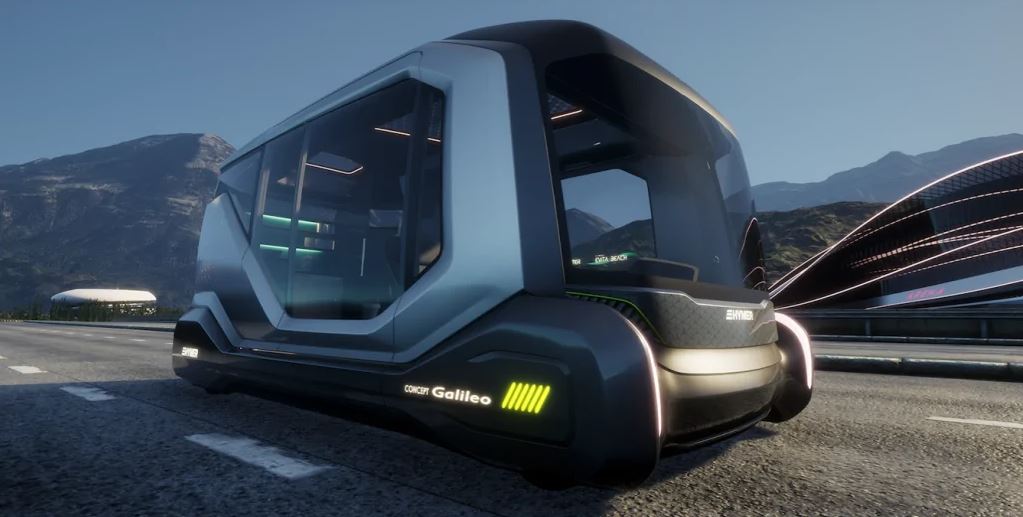Buoyed by the overwhelming response to their VisionVenture camper at this year’s Dusseldorf Caravan Salon, Erwin Hymer is already one step ahead of the electric RV market and in fact are now delving into the realms of autonomous vehicle technology with their Galileo camper concept.
This concept vehicle is less a camper and more a self-driving apartment on wheels, with a modular camping pod sitting on an electrically-powered flat chassis offering full customization and a relaxing holiday from start to finish for the user.

As technology progresses at an ever-increasing pace it’s becoming more and more apparent that self-driving cars are the future of the automotive industry. The Erwin Hymer Group is already well aware of this trend and as such they are the first RV company to set their sights on autonomous campers. Their Hymer North America branch was one of the first companies to be granted an autonomous license in Canada before its collapse, but that hasn’t stopped their German headquarters from making leaps and bounds of progress in what Hymer calls the five stages of autonomous driving, exploring everything from driving assistance and automatic parking technologies right up to fully automated driving.
This autonomous driving is made possible by a network of cameras, radar and lidar systems, and the idea of an engine-less camper opens up a whole range of possibilities for new interior layouts and features.

Anticipating the year 2030 when self-driving vehicles will rule the roads, Erwin Hymer has created an ultra-modern concept design for the modular Galileo camping pod to take the hard work out of a road trip and instead create a more relaxing holiday experience where the holiday starts from the first mile. No longer will frustrated parents drive hundreds or even thousands of miles to their holiday destination while the kids chant incessantly, “Are we there yet?!” Instead, the entire family can relax, kick back, watch TV or enjoy the view as their apartment on wheels navigates itself to their chosen destination.

The Galileo begins at base level with a flat electrically-powered skateboard-style chassis. The modular camping pod’s layout and amenities are personalized by the customer and it is assembled in the factory using sustainable and renewable materials before being dropped onto the chassis.

The entire unit can then be placed onto the road and deliver itself to the customer, although Hymer envisages offering rental and sharing options too. The chassis’ battery pack will be sized dependant on the predicted mileage, however, the camper pod could also be capable of pre-routing itself to stop at various charging stations along the route, much the same as an electric car would need to on a long journey.

The interior concept design appears to be high tech and ultra modern, sharing many similarities with Hymer’s other recent camper concept, the VisionVenture. Thanks to the lack of a traditional combustion engine, a large open floor plan from front to back is created which makes this feel like less of a camper and more an apartment on wheels. Large tinted panoramic windows and a glass ceiling offer many different angles from which to enjoy the view as passengers kick back in comfy swivel seats, and the entire unit is packed with smart technology such as information displays on the windows and a health-monitoring system.

Hymer’s video rendering shows a wraparound kitchen block at the rear of the vehicle in a vision of black and green with LED-lit shelves and under-cabinet lighting, as well as a digital interactive screen for displaying recipes and shopping lists. It also includes some of the more standard RV-type equipment such as storage drawers, a sink, an induction cooktop, a convertible dinette and wooden yacht-style flooring similar to that seen in the VisionVenture.

Even the bathroom has been modernized, with a digital screen display and black privacy glass doors along with the sink and toilet, and the two bunk beds create a bedroom area along with backlit shelves and clothes storage.

Borrowing yet another idea from the popular VisionVenture, Hymer has envisaged the Galileo having a deployable outdoor wooden deck with cooking area created by raising the glass window upward, tail-gate style.

As the Galileo is just another of Hymer’s forward-thinking visions of the future we don’t have any idea of prices or specs just yet, and probably won’t do for the next 11 years, however it’s exciting to see RV companies thinking so far out of the box and making progress in the industries of the future.
Source: Erwin Hymer Group





